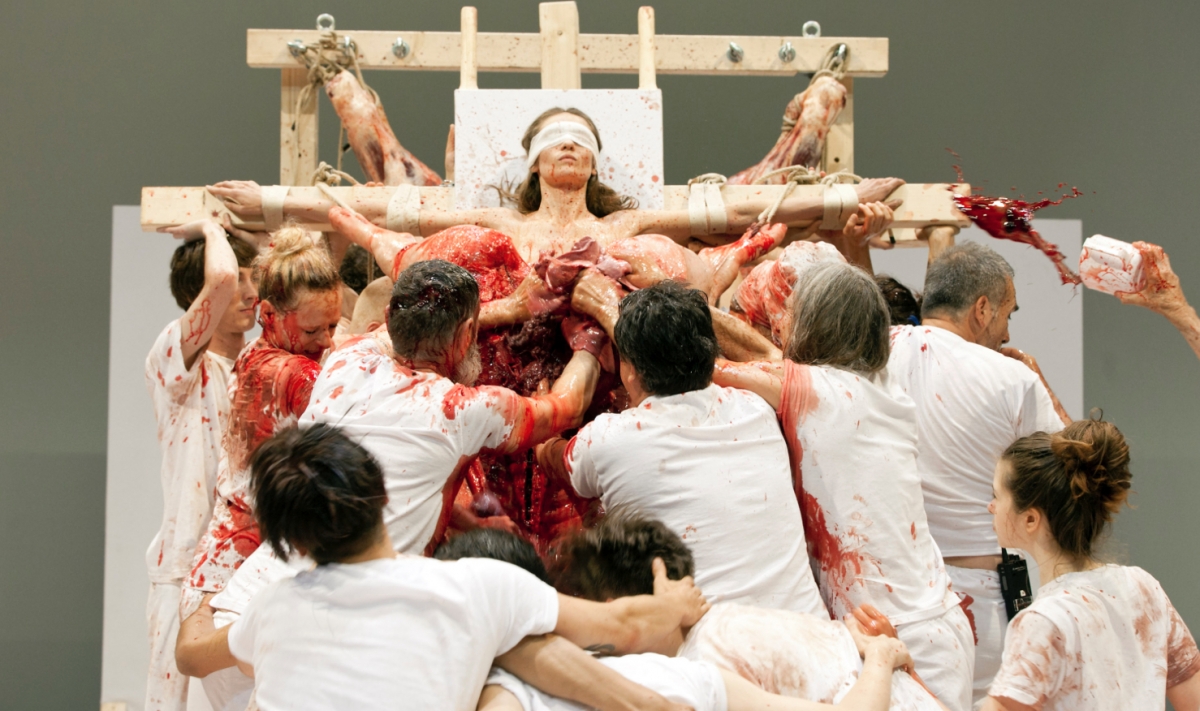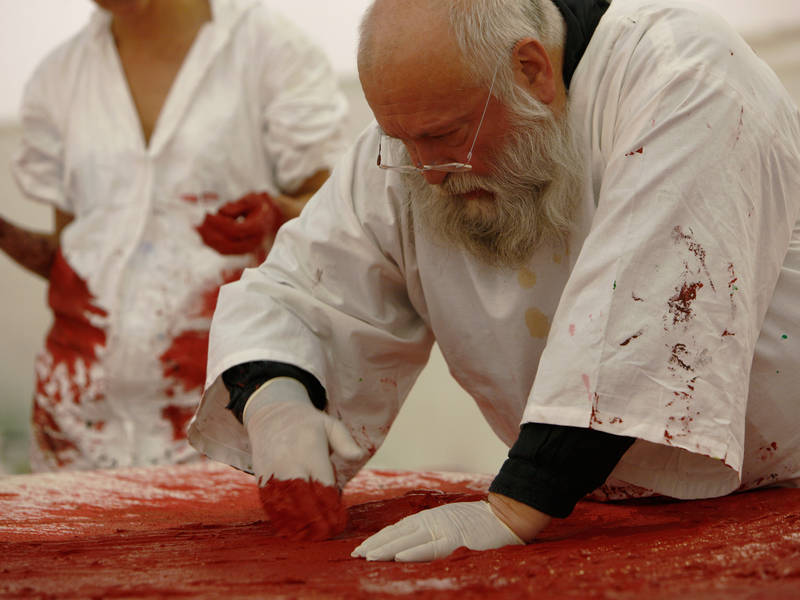Animal rights groups have slammed a performance artwork due to take place at Hobart’s Dark Mofo festival this June. Hermann Nitsch’s 150.Action, billed by Dark Mofo as “a bloody, sacrificial ritual performed by the patriarch of Viennese Actionism, his devoted disciples and an orchestra,” will contain “distressing imagery, nudity and strong adult themes, and is not suitable for children” the festival’s website warns.
The head of RSPCA Tasmania has described the artwork as disrespectful to the animals involved and “tap dances across the line” of what is acceptable, reported The Guardian, while a petition by the animal rights group, Animal Liberation Tasmania, calling for Hobart City Council to intervene and stop the event has already garnered almost 12,000 signatures.
 A performance artwork by Hermann Nitsch in Leipzig in 2013
A performance artwork by Hermann Nitsch in Leipzig in 2013
“We are aware that a bull will be slaughtered specifically for usage in this bloody performance piece,” the petition reads. “We are opposed to this event, which trivialises the slaughter of animals for human usage, and condemns a sentient being to death in pursuit of artistic endeavours.”
Animal Liberation Tasmania’s petition has also been signed by Hobart’s Lord Mayor Sue Hickey (to whom it will eventually be delivered) who told The Herald Sun she found the work offensive and that she planned to speak with Premier Will Hodgman about whether the event could be prevented. “I don’t know when art ceases to be art, when it crosses that line and becomes something really perverse, but I think we’re very close to that mark now,” she said. “I’m a great champion of Mofo — they’ve really stretched our boundaries and tested our senses and put Tasmania on the map — but they’re not God unto themselves and they should be pulled up when they cross that line.”
“I’m certainly not a prude,” she said, “but having looked at the work of this artist I found most of it to be extremely offensive, degrading to women and animals and people who believe in church, and I don’t see anything in it that’s worthy of sponsorship.”
 Hermann Nitsch. Photos © The Nitsch Foundation
Hermann Nitsch. Photos © The Nitsch Foundation
Dark Mofo’s creative director Leigh Carmichael has been quick to address the controversy. “Firstly, and most importantly, there will not be a live animal slaughtered as part of any Dark Mofo performance,” he said, clarifying that Nitsch would be using a locally-sourced, humanely-killed animal already destined for the meat market. The performance will also include fish and fruit.
It is also the artist’s intention that the meat be eaten following the performance. “We are working through addressing the health and safety regulations to achieve this outcome,” Carmichael told the Sydney Morning Herald.
Kristy Alger from Animal Liberation Tasmania told The Mercury the group was looking at options to have the performance shut down. “People power is what we’re also going to need to use for this,” she said. “But, we’ve got to be really careful because as an artist, Nitsch thrives on controversy so if we give him that controversy, he’s going to get a bigger platform for what he’s doing.”
Art collector David Walsh, whose Museum of Old and New Art presents Dark Mofo, posted his musings on the issues and moral complexities raised by the artwork on the museum’s blog, from its allusions to the atrocities of World War II to the rituals of the Catholic church to what it says more generally about the meat industry and moral culpability. “Even if the protestors have their way,” he says, “[the bull] will end up in burgers or cat food (maybe the protestors, if successful in their endeavour, should pay for this beast to spend the term of its natural life indulging its vegan habits—would they be happy if we agreed to spare two animals in return for this bull being Nitsched? Such is the sanctimonious calculus of moral equivalence).”
“I’m planning to aid and abet the murder of this animal,” Walsh explains. “Is it possible that those who oppose this performance are aiding and abetting the iniquitous system, by concealing one more slaughter? Throughout this blog, and my adult life, I’ve not been able to find an answer to these questions, as this blog acknowledges. I expect more than the usual number of responses to this tirade. I do hope I learn something.”
“For my purposes, it is good art. I believe that it has already spiked a conversation about the appropriateness of slaughter, and Dark Mofo hasn’t even happened yet,” he went on. “I want the audience to ponder why meat for food is okay (at least people aren’t protesting at Mona’s barbeque) but meat for ritual or entertainment isn’t.” Walsh also pointed out that cancelling the event won’t save the taxpayers any money – unless the whole of Dark Mofo is cancelled. “I kick in about $750,000, so it’ll just give me a better bottom line,” he said.
Nitsch himself is no stranger to controversy, his artworks regularly causing a stir, and an exhibition of his work in Mexico in 2015 was cancelled. That same year an Italian animal rights group started a petition to have a performance of Nitsch’s work in Palermo cancelled, garnering more than 70,000 signatures.
A counter petition, calling for the public to support art, anti-censorship and Hermann Nitsch’s action at Dark Mofo has so far gathered seven signatures. “We understand that his work will be confronting and difficult,” said Carmichael, “but we will not shy away from presenting work that challenges us to consider the ethical implications of our actions both today, and in the past.”











Comments
Log in to join the conversation.